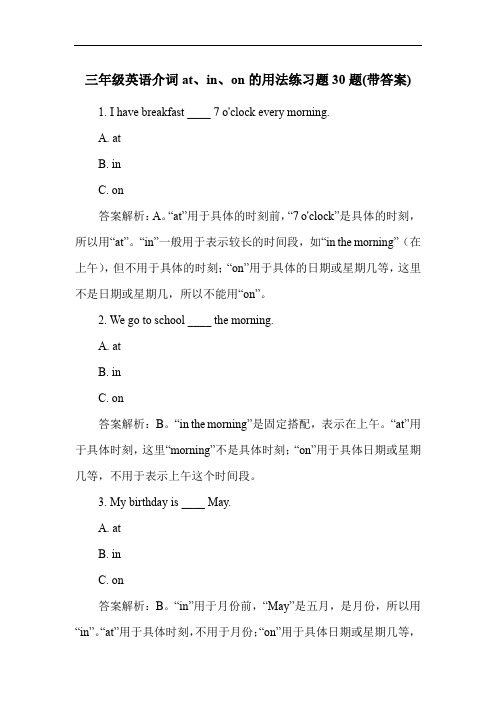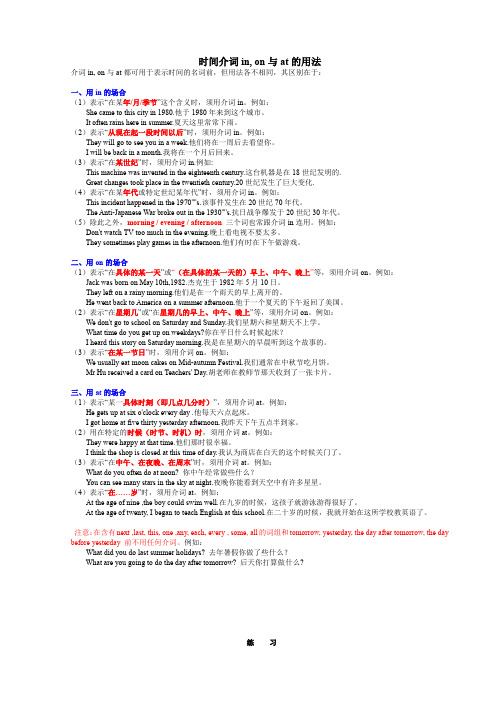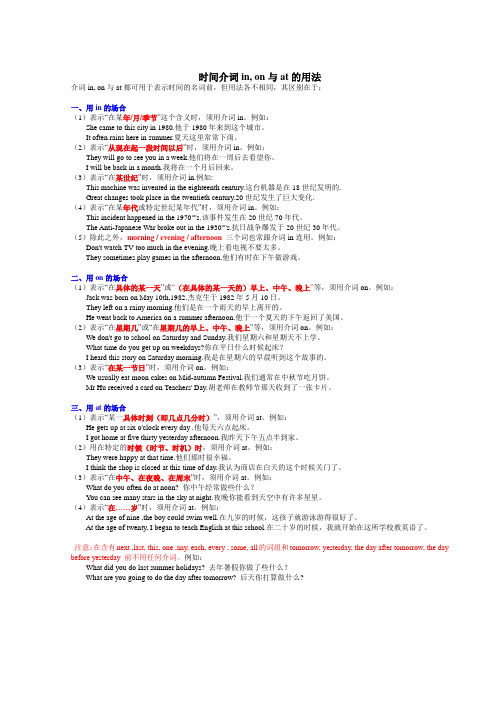介词in,on,at与其练习附答案
三年级英语介词at、in、on的用法练习题30题(带答案)

三年级英语介词at、in、on的用法练习题30题(带答案)1. I have breakfast ____ 7 o'clock every morning.A. atB. inC. on答案解析:A。
“at”用于具体的时刻前,“7 o'clock”是具体的时刻,所以用“at”。
“in”一般用于表示较长的时间段,如“in the morning”(在上午),但不用于具体的时刻;“on”用于具体的日期或星期几等,这里不是日期或星期几,所以不能用“on”。
2. We go to school ____ the morning.A. atB. inC. on答案解析:B。
“in the morning”是固定搭配,表示在上午。
“at”用于具体时刻,这里“morning”不是具体时刻;“on”用于具体日期或星期几等,不用于表示上午这个时间段。
3. My birthday is ____ May.A. atB. inC. on答案解析:B。
“in”用于月份前,“May”是五月,是月份,所以用“in”。
“at”用于具体时刻,不用于月份;“on”用于具体日期或星期几等,这里不是具体日期,不能用“on”。
4. She has a party ____ Saturday.A. atB. inC. on答案解析:C。
“on”用于星期几前,“Saturday”是星期六,所以用“on”。
“at”用于具体时刻,不用于星期几;“in”用于较长时间段,不用于星期几。
5. They play football ____ the afternoon.A. atB. inC. on答案解析:B。
“in the afternoon”是固定搭配,表示在下午。
“at”用于具体时刻,这里“afternoon”不是具体时刻;“on”用于具体日期或星期几等,不用于表示下午这个时间段。
6. He goes to bed ____ 9:30.A. atB. inC. on答案解析:A。
at on in练习题答案

at on in练习题答案at on in练习题答案在学习英语的过程中,我们经常会遇到一些关于介词的练习题。
其中,at、on 和in是最常用的三个介词。
它们在表示时间、地点和位置上有着不同的用法。
下面是一些常见的练习题及其答案,希望对大家的学习有所帮助。
1. I will meet you _______ the library.答案:at解析:在表示地点时,我们通常使用at来表示在某个地方碰面。
例如:at the library(在图书馆)。
2. My birthday is _______ May.答案:in解析:在表示时间时,我们通常使用in来表示在某个月份。
例如:in May(在五月)。
3. We have a meeting _______ 9 o'clock.答案:at解析:在表示时间时,我们通常使用at来表示在某个具体的时间点。
例如:at 9 o'clock(在九点钟)。
4. I have an appointment _______ Monday morning.答案:on解析:在表示时间时,我们通常使用on来表示在某个具体的日期或某个星期几。
例如:on Monday morning(在星期一上午)。
5. The book is _______ the table.答案:on解析:在表示位置时,我们通常使用on来表示在某个平面上。
例如:on the table(在桌子上)。
6. The cat is _______ the chair.答案:on解析:在表示位置时,我们通常使用on来表示在某个物体的表面上。
例如:on the chair(在椅子上)。
7. She lives _______ a small town.答案:in解析:在表示地点时,我们通常使用in来表示在某个城市、国家、地区等范围内。
例如:in a small town(在一个小镇上)。
8. The party will be held _______ the weekend.答案:on解析:在表示时间时,我们通常使用on来表示在某个周末。
12 介词in,on,at 全国通用版(含答案)

语法——介词in on atPart 1:知识点一、介词:是一种虚词,在句子中表示名词或代词与其他词之间的关系,不能单独做为句子成分,常位于名词或代词前面构成介词短语。
二、具体用法:常用介词1.in(1)表示方位:在……里面例句:There are three books in my bag.我书包里有三本书。
(2)表示地点:A.表示在大地方例句:I live in Hangzhou.我住在杭州。
B.表示属于该范围例句:Hei Longji ang lies in the north of China.黑龙江在中国北部。
(3)表示时间:A.表示一段时间(比较长)例:in summer在夏天in 2021在2021年in February 在二月B.表示在早上、下午、晚上例:in the morning/afternoon/evening(4)表示使用某种材料、语言等:例句:I can sing the song in English.我能用英语唱这首歌。
2.on(1)表示地点:在……上面例句:There is an apple on the desk.桌子上有一本书。
(2)表示时间:A.表示在具体某一天的上午、下午或晚上例:on June thirteenth在六月13日on the morning of May 1st在五月一日的早上B.表示在星期几的上午、下午或晚上例:on Friday在周五on Saturday afternoon在周六的下午2.at(1)表示在小地点:例:at school /home(2)表示时间点:例:at seven在七点at night在夜晚Part 2:练习一、用介词填空。
1.My mother begins to work ______ 8:00 ______ t he morning.2.Do you stay ______ home ______ weekend?3.They live ______ a new house now.4.Xinjiang is ______ the west of China.5.Lily usually have breakfast ______ the morning.6.They often have lunch ______ half past twelve.7.What’s this ______ English?8.There is a big gym ______ my school.9.She came to this city ______ 2020.10.It often snows here ______ winter.11.I will be back ______ a month.12.Don’t watch TV too much ______ the evening.13.Sally was born ______ May 11th.14.We don’t go to school ______ Saturday and S unday.15.They were happy ______ that time.16.______ the age of ten, I began to learn English.17.What do you often do ______ noon?18.______ a cold winter morning, I met her in the street.19.Mrs. Green came to Beijing ______ 2005.20.Children wake up very early ______ the morning ofChristmas Day.答案:1.at in2.at on3.in4.in5.in6.at7.in8.in9.in 10.i n 11.in 12.in 13.on 14.on 15.at 16.At 17.at 18.On 19.in 20.on。
广州小学英语五年级介词in-on-at及其练习附答案

时间介词in, on与at的用法介词in, on与at都可用于表示时间的名词前,但用法各不相同,其区别在于:一、用in的场合(1)表示“在某年/月/季节”这个含义时,须用介词in。
例如:She came to this city in 1980.他于1980年来到这个城市。
It often rains here in summer.夏天这里常常下雨。
(2)表示“从现在起一段时间以后”时,须用介词in。
例如:They will go to see you in a week.他们将在一周后去看望你。
I will be back in a month.我将在一个月后回来。
(3)表示“在某世纪”时,须用介词in.例如:This machine was invented in the eighteenth century.这台机器是在18世纪发明的.Great changes took place in the twentieth century.20世纪发生了巨大变化.(4)表示“在某年代或特定世纪某年代”时,须用介词in。
例如:This incident happened in the 1970''''s.该事件发生在20世纪70年代。
The Anti-Japanese War broke out in the 1930''''s.抗日战争爆发于20世纪30年代。
(5)除此之外,morning / evening / afternoon三个词也常跟介词in连用。
例如:Don't watch TV too much in the evening.晚上看电视不要太多。
They sometimes play games in the afternoon.他们有时在下午做游戏。
二、用on的场合(1)表示“在具体的某一天”或“(在具体的某一天的)早上、中午、晚上”等,须用介词on。
广州小学英语五年级介词in-on-at及其练习附答案

时间介词in, on与at的用法介词in, on与at都可用于表示时间的名词前,但用法各不相同,其区别在于:一、用in的场合(1)表示“在某年/月/季节”这个含义时,须用介词in。
例如:She came to this city in 1980.他于1980年来到这个城市。
It often rains here in summer.夏天这里常常下雨。
(2)表示“从现在起一段时间以后”时,须用介词in。
例如:They will go to see you in a week.他们将在一周后去看望你。
I will be back in a month.我将在一个月后回来。
(3)表示“在某世纪”时,须用介词in.例如:This machine was invented in the eighteenth century.这台机器是在18世纪发明的.Great changes took place in the twentieth century.20世纪发生了巨大变化.(4)表示“在某年代或特定世纪某年代”时,须用介词in。
例如:This incident happened in the 1970''''s.该事件发生在20世纪70年代。
The Anti-Japanese War broke out in the 1930''''s.抗日战争爆发于20世纪30年代。
(5)除此之外,morning / evening / afternoon三个词也常跟介词in连用。
例如:Don't watch TV too much in the evening.晚上看电视不要太多。
They sometimes play games in the afternoon.他们有时在下午做游戏。
二、用on的场合(1)表示“在具体的某一天”或“(在具体的某一天的)早上、中午、晚上”等,须用介词on。
介词in,on,at及其练习附答案(解析版)

介词in,on,at及其练习附答案(解析版)介词in、on和at在表示时间的名词前的使用有所不同。
具体区别如下:一、使用in的情况:1.表示“在某年/月/季节”时,需要使用介词in。
例如:她于1980年来到这个城市。
夏天这里经常下雨。
2.表示“从现在起一段时间以后”时,需要使用介词in。
例如:他们将在一周后去看望你。
我将在一个月后回来。
3.表示“在某个世纪”时,需要使用介词in。
例如:这台机器是在18世纪发明的。
20世纪发生了巨大变化。
4.表示“在某个年代或特定世纪某个年代”时,需要使用介词in。
例如:该事件发生在20世纪70年代。
抗日战争爆发于20世纪30年代。
5.除此之外,morning、evening和afternoon三个词也常与介词in连用。
例如:晚上看电视不要太多。
他们有时在下午做游戏。
二、使用on的情况:1.表示“在具体的某一天”或“(在具体的某一天的)早上、中午、晚上”等,需要使用介词on。
例如:杰克生于1982年5月10日。
他们是在一个雨天的早上离开的。
他于一个夏天的下午返回了美国。
2) 表示星期几或其时间,需使用介词on。
例如:我们星期六和星期天不上学。
平日你几点起床?我是在星期六的早晨听到这个故事的。
3) 表示某个节日,需使用介词on。
例如:我们通常在中秋节吃月饼。
胡老师在教师节那天收到了一张卡片。
1) 表示具体时间点,需使用介词at。
例如:他每天六点起床。
昨天下午五点半我到家了。
2) 表示特定的时节或时机,需使用介词at。
例如:他们那时很幸福。
我认为商店在白天的这个时候关门了。
3) 表示中午、夜晚或周末,需使用介词at。
例如:你中午经常做些什么?夜晚你能看到天空中有许多星星。
4) 表示某个年龄,需使用介词at。
例如:这个男孩在九岁的时候就游泳游得很好了。
When I was twenty years old。
I started teaching English at a school。
in,on 和 at 的用法区别习题(答案及解析)

介词 in,on 和 at 短小精悍,但用法差异很大,稍不留神就会用错。
一、用介词 in,on 或 at 完成下面的句子1、My sister was born _____ 1984.2、My birthday is _____ September.3、I left the keys _____ the counter.4、We are meeting _____ the stadium.5、I live _____ an apartment.6、My birthday is _____ June 25th.7、There is a great video _____ YouTube.8、I saw your profile _____ LinkedIn.9、She lives _____ Florida.10、Let's get connected _____ Facebook.11、He is _____ the phone.12、My appointment is _____ 5:00pm.13、See you _____ Monday.14、See you _____ a couple days.15、It will be _____ the end of the week.二、答案及解析1、in解析:修饰时间时,in 用于月,年,四季、世纪或很长的时间段,包括一天中的特定时间段,所以选 in。
2、in解析:同题1。
3、in解析:当描述一个物体或一个人的位置时, in 表示该物体在一个区域的边界内或包含在其他物体内,所以选 in。
4、at解析:修饰地点时,at 用于一个位置或地点,通常把它看作一个点,在这里把 stadium 看作一个点。
On the stadium 可能描述的是在体育馆的地面上,in the stadium 描述的是在体育馆内,而 at the stadium 可以指在体育馆里或是靠近体育馆的地方,因此这里选择 at 更合理。
时间介词in,on,at用法练习答案解析

时间介词: in/on/atA. onB. atC. toD. in参考答案: D“年”前面用介词 in ,故正确答案为 D。
A. inB. onC. atD. to参考答案: A“月份”前面用介词 in ,故正确答案为 A。
A. atB. onC. inD. to参考答案: C“季节”前面用介词 in ,故正确答案为 C。
A. inB. atC. onD. of参考答案: B“时间点”前面用介词 at,“half past ten”是时间点,故正确答案为 B。
A. to; inB. at; inC. for; atD. at; to参考答案: B“时间点”前面用介词 at,在“早上”前面用 in ,故正确答案为 B。
My grandfather was born ______ Oct. 10, 1935 . (on/in)参考答案: on“具体到某一天”用介词 on ,故该空应填on 。
______ a cold winter morning, I met her in the street . (on/in)参考答案: on“具体到某一天的早上”用介词 on ,该句具体到了“在一个寒冷的冬天的早上” ,因此应该用介词 on 。
8 选择适当的单词填空They started off ______ an autumn afternoon . (on/in)参考答案: on“具体到某一天的下午”用介词 on ,该句具体到了“在一个秋天的下午” ,因此应该用介词 on。
A. onB. atD. during参考答案: A“具体到某一天晚上”用介词 on ,该句具体到了“在一个下雨的晚上” ,因此应该用介词 on ,故正确答案为 A。
A. in; onB. on; inC. on; onD. in; at参考答案: C“September 3, 1991”具体到了某一天,因此应该用介词 on ,“a cold morning”具体到了某一天的早上,因此也应该用介词 on ,故正确答案为 C。
- 1、下载文档前请自行甄别文档内容的完整性,平台不提供额外的编辑、内容补充、找答案等附加服务。
- 2、"仅部分预览"的文档,不可在线预览部分如存在完整性等问题,可反馈申请退款(可完整预览的文档不适用该条件!)。
- 3、如文档侵犯您的权益,请联系客服反馈,我们会尽快为您处理(人工客服工作时间:9:00-18:30)。
时间介词 in, on 与 at 的用法介词 in, on 与 at 都可用于表示时间的名词前,但用法各不相同,其区别在于:一、用 in 的场合(1)表示“在某年/月 /季节”这个含义时,须用介词in。
例如:For personal use only in study and research; not for commercial useShe came to this city in 1980他.于 1980 年来到这个城市。
It often rains here in summer夏.天这里常常下雨。
(2)表示“ 从现在起一段时间以后”时,须用介词in。
例如:For personal use only in study and research; not for commercial useThey will go to see you in a week.他们将在一周后去看望你。
I will be back in a month. 我将在一个月后回来。
(3)表示“在某世纪”时,须用介词in.例如 :For personal use only in study and research; not for commercial useThis machine was invented in the eighteenth century这.台机器是在 18 世纪发明的 .Great changes took place in the twentieth century.20世纪发生了巨大变化 .(4)表示“在某年代或特定世纪某年代”时,须用介词in。
例如:For personal use only in study and research; not for commercial useThis incident happened in the 1970''''s该.事件发生在 20 世纪 70 年代。
The Anti-Japanese War broke out in the 1930''''s抗.日战争爆发于20 世纪 30 年代。
(5)除此之外, morning / evening / afternoon三个词也常跟介词in 连用。
例如:Don't watch TV too much in the evening.晚上看电视不要太多。
They sometimes play games in the afternoon他.们有时在下午做游戏。
二、用 on 的场合(1)表示“在具体的某一天”或“(在具体的某一天的)早上、中午、晚上”等,须用不得用于商业用途介词 on。
例如:Jack was born on May 10th,1982杰.克生于 1982 年 5 月 10 日。
They left on a rainy morning.他们是在一个雨天的早上离开的。
He went back to America on a summer afternoon他.于一个夏天的下午返回了美国。
(2)表示“在星期几”或“在星期几的早上、中午、晚上”等,须用介词on。
例如:We don't go to school on Saturday and Sunday我.们星期六和星期天不上学。
What time do you get up on weekdays?你在平日什么时候起床?I heard this story on Saturday morning我.是在星期六的早晨听到这个故事的。
(3)表示“ 在某一节日”时,须用介词 on。
例如:We usually eat moon cakes on Mid-autumn Festival我.们通常在中秋节吃月饼。
Mr Hu received a card on Teachers' Day胡.老师在教师节那天收到了一张卡片。
三、用 at 的场合(1)表示“某一具体时刻(即几点几分时)”,须用介词 at。
例如:He gets up at six o'clock every day 他.每天六点起床。
I got home at five thirty yesterday afternoon.我昨天下午五点半到家。
(2)用在特定的时候(时节、时机)时,须用介词 at。
例如:They were happy at that time他.们那时很幸福。
I think the shop is closed at this time of day我.认为商店在白天的这个时候关门了。
(3)表示“在中午、在夜晚、在周末”时,须用介词at。
例如:What do you often do at noon? 你中午经常做些什么?You can see many stars in the sky at night夜.晚你能看到天空中有许多星星。
(4)表示“ 在⋯⋯岁”时,须用介词at。
例如:At the age of nine ,the boy could swim well.在九岁的时候,这孩子就游泳游得很好了。
At the age of twenty, I began to teach English at this school在.二十岁的时候,我就开始在这所学校教英语了。
注意:在含有 next ,last, this, one ,any, each, every , some, all的词组和 tomorrow, yesterday, the day after tomorrow, the day before yesterday前不用任何介词。
例如:What did you do last summer holidays? 去年暑假你做了些什么? What areyou going to do the day after tomorrow? 后天你打算做什么 ?不得用于商业用途练习( ) 1. Children get gifts ____ Christmas and ____ their birthdays.A. on; onB. at; onC. in; inD. in; on( ) 2.----There is nothing ____tomorrow afternoon, is there? -----No. We can have a game of table tennis.A. onB. inC. outD. up( ) 3. A lot of students in our school were born____March, 1981.A. inB. atC. onD. since( ) 4. He suddenly returned____ a rainy night.A. onB. atC. inD. during( ) 5. My grandfather was born____Oct. 10, 1935.A. onB. inC. atD. of( ) 6. The train is starting___five minutes.A. inB. atC. forD.still( ) 7. Mike does his exercises ____ seven _____ the evening.A. on; toB. at; inC. by; ofD. at; on( ) 8. Children wake up very early____the morning of Christmas Day.A. inB. onC. forD. at( ) 9 ____ a cold winter morning, I met her in the stfeet.A. InB. OnC. AtD. For( ) 10 It happened to be very cold____ the morning of our sports meeting.A. atB. onC. withD. of( ) 11. Why did you get up so early ___ this morning.A. onB. /C. atD. in( ) 12. He went to Shanghai___ September 3, 1991 and came back___ a coldmorning last year.A. in; onB. on; inC. on; onD. in; ia( ) 13. Lucy was born____ the night of May 12, 1984. . ...A. onB. inC. atD. to( ) 14. Mrs Brown came to China ____ 1996.A.onB. ofC. to,D. in( ) 15 ___ the morning of November 20, 1915, the workers came to Chicago to show their mourning of Joe Hill.A. OnB. InC. OnD. At不得用于商业用途( ) 16. Ann moved___Hangzhou___September, 1992.A. /; inB. to; inC. to; on D, in; in( ) 17. They started off___an autumn afternoon.A. duringB. atC. inD. on( ) 18. He often goes ____ school ____ six thirty ____ the morning.A. for; to; inB. to; at; inC. to; for; at D, for; at; to( ) 19. He arrived ___ Shanghai ___ 9: 30 ___ March 5. A. at; in; at B. to; on; at C. in; on; at D. in; at; on( ) 20.The English teacher told me to get there____ half past ten.A: in B. at C. on D. of答案:BAAAA ABBBB BCADB ADBDB不得用于商业用途仅供个人用于学习、研究;不得用于商业用途。
For personal use only in study and research; not for commercial use.Nur f ü r den pers?nlichen f ü r Studien, Forschung, zu kommerziellen Zwecken verwendet werden.Pour l ' é tude et la recherche uniquement à des fins personnelles; pas à des fins commerciales.толькодлялюдейкоторые,используютсядляобучениясследований,недолжныиспользоватьсяв коммерческихцелях.以下无正文不得用于商业用途。
